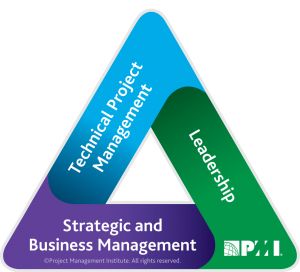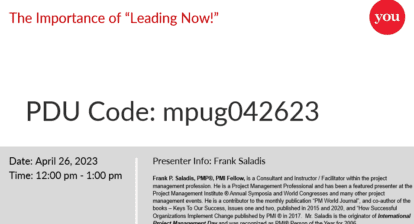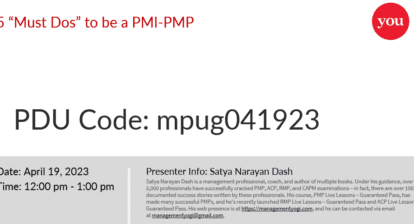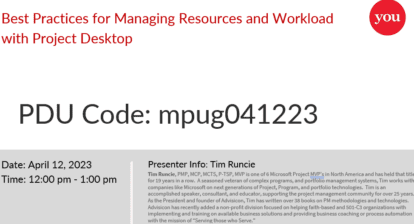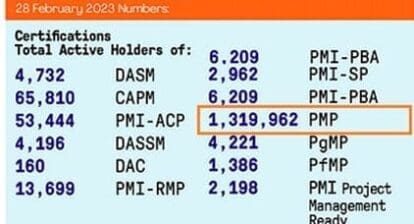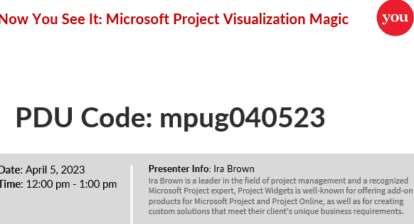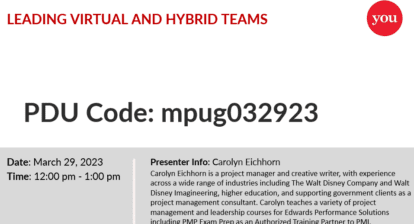 Ever had a manager who is a technical guru but has poor leadership skills? I think we’ve all been there at least once.
Ever had a manager who is a technical guru but has poor leadership skills? I think we’ve all been there at least once.
Technical gurus are rock-solid at what they do. With a unique skillset and “get it done” mentality, they’re the people you love to have on your team. And, it’s probably critical that you do. But generally, at some point in their careers, these same technical gurus are either forced into management roles or begin to think about managing their own teams. It’s a natural career progression. Isn’t it? Actually, no; it’s not always the case.
It takes more than technical project management skills to be successful. A previous Project Management Institute’s (PMI) Pulse of the Profession in Depth Report revealed that 75 percent of organizations rank leadership skills as the most important for successful navigation of complexity in projects. As a learning and development professional, I was thrilled to learn that PMI agrees that leadership skills are critical for effective project management.
In December 2015, PMI stayed true to their beliefs by releasing modifications to their Continuing Certification Requirements (CCRs), including the addition of a new PMI Talent Triangle.
Why the Change?
As PMI explains, this little figure emphasizes the ideal skill set — a combination of technical, leadership and strategic and business management expertise.
I can safely say I’m not alone in thinking that effective project managers (PMs) need good leadership skills, not just technical expertise. I also believe that good managers and leaders don’t need to be technical gurus to successfully manage technical projects or projects that are not necessarily part of their subject matter expertise.
From Technical Guru to Project Manager
The transition from a technical mindset to manager/leader can be difficult. As a technical expert, whether that person is a technical lead, engineer or contractor, the main responsibility is to finish the project, on time and on budget. Now, imagine doing that difficult technical job while managing a team. Do you think you’d have the time to perfect your craft while writing annual performance reviews? It’s difficult to do both well. Often, you stay busy with customer obligations, while trying to manage and develop your team, so neither job receives your best. Unfortunately, what makes you a great engineer might make you a poor manager. If you spend all day coding, you’re not spending nearly enough time managing the team. Finding a balance of technical and soft skills is essential for good project management. That’s why PMs need to have the leadership component.
Often, people with little to no leadership experience find themselves in project management positions due to tenure or employee turnover. They can “tech” with the best of them, but they may lack “people skills” or “soft skills” training and not know the first thing about managing a team — exposing a disconnect between technical and leadership components. To combat this gap, the PMI Talent Triangle emphasizes both project management/leadership experience and training as critical in demonstrating how to manage, lead and communicate as well as oversee issues and challenges — a true operational leadership management perspective.
CCR Then and Now
Before the CCR update and the addition to the PMI Talent Triangle, PMs earned continuing education based on PMI’s knowledge areas by submitting their processes and a short excerpt on technical task or project responsibilities. Now, the emphasis is also on how PMs need to be strategic business leaders. The Project Management Body of Knowledge (PMBOK®) — PMI’s book of rules and standards — has released its sixth edition to include strategic leadership and technical components. It also explains how PMI components such as knowledge and process areas complement each other.
Soft skills combined with strong technical skills are critical elements of successful leadership qualities. I think modifying the CCR was a smart move. By teaching technical gurus how to manage effectively, PMI is ensuring future leaders are best equipped for their roles.
A version of this article originally appeared on the Edwards Performance Solutions blog.
Related Content
Webinars (watch for free now!):
Collaborative Project Management – Process & Power Skills
How to Drive PM Best Practices into Organizations with No PM Savvy Executives. “Just do it” culture.
Articles:
Doing Good with Project Management
How to Fight Back Against Alternative Facts
Breaking the Barrier: How to Set the Groundwork for Change


